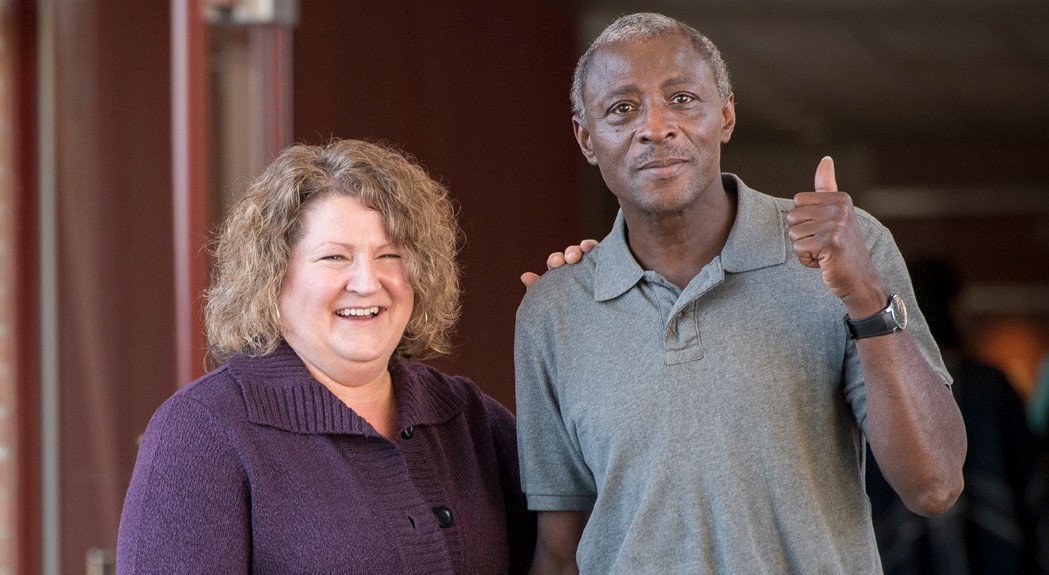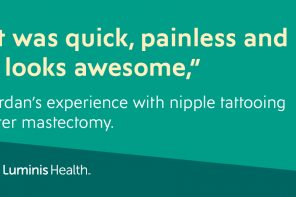It wasn’t easy for Dwight Watkins to quit smoking. He’d been doing it for nearly 50 years. But he finally had enough.
Dwight had been smoking since he was 12 years old, and he was up to a pack a day. It was hurting his body in major ways. Emphysema and chronic bronchitis made it hard to breathe.
“I said, ‘I have to do this. I have to stop,’” says Dwight, who is 63. “And I started from there.”
A Long Rough Road
As any former smoker knows, the road to quitting can be a rough and long one. The nicotine found in tobacco products creates a sense of pleasure in your brain and causes you to crave more. That’s why it’s difficult to quit smoking. That was certainly the case for Dwight.
Dwight’s primary care physician, Eman Al-Samrrai, MD, showed him the benefits if he quit smoking — and what could happen if he didn’t. “I told him, ‘You have the power in your hands,’” Dr. Al-Samrrai says. “It had to be his choice to quit.”
She recommended that Dwight work with Tuesday Tynan, a tobacco treatment specialist and smoking cessation counselor at AAMC’s Morris Blum Community Clinic, where Dwight is a resident. AAMC offers a free program at Morris Blum that helps smokers quit for good.
Dwight began working with Tuesday in January 2015. Since then, they’ve met nearly every week. “‘Dedicated’ is the word to describe Dwight,” Tuesday says. “I’ve never had anybody visit me every week for so long.”
AAMC offers a number of resources to help you quit smoking:
-
- Smoking cessation counselors
-
- One-on-one or group counseling sessions
-
- “Become Tobacco Free” classes
Through AAMC’s smoking cessation program, tobacco treatment specialists, like Tuesday, and primary care doctors help patients quit smoking through counseling and creating a care plan.
“We like to say that quitting tobacco is not an event but a journey. We are here to help people work through their specific barriers,” Tuesday says.
When starting the program, each person receives a quit kit: a water bottle filled with cinnamon sticks, lollipops, coffee stirrers, stress balls, etc. The idea is for you to hold these items instead of a cigarette.
The staff also gives patients over-the-counter nicotine replacement medications, such as patches, gum and lozenges. These replacements help satisfy the craving for nicotine and reduce the need to smoke.
Nicotine replacement helped Dwight get down to about six cigarettes a week. But he still had trouble quitting completely.
“There were a couple of times I got knocked down and got frustrated because I couldn’t do it,” Dwight says. “I’d stop for a day or two, then drift back and have another cigarette. It went on and on like that.”
Dwight also faced a lot of peer pressure from friends and neighbors who would offer him cigarettes. “It was stressful because people didn’t understand why I didn’t want to smoke anymore,” he says. “I just told myself to hang in there.”
-
- 20 minutes after quitting: Your blood pressure and heart rate decrease.
-
- 12 hours after quitting: The carbon monoxide level in your blood returns to normal.
-
- 2 weeks after quitting: Your circulation begins to improve.
-
- 1 year after quitting: Your risk of coronary heart disease is cut in half.
-
- 5 years after quitting: Your risk of stroke is similar to that of a nonsmoker.
Source: The American Heart Association
The Winning Recipe
To finally ditch smoking, Dwight began using Chantix, a prescription medication. He also kept up his weekly meetings with Tuesday. He’s been smoke-free since April 2016. “I just kept my mind determined,” he says.
Recently, Dwight received a surprise for his hard work and dedication. He won a $250 Target gift card through AAMC’s “Breathe More Moments” contest, which promotes early lung cancer screening for people 55 years and older with a long history of smoking.
“I thought Tuesday was trying to pull my leg when she told me I had won,” says Dwight, laughing. “I had never won anything before.”
Dwight has changed his life dramatically. He gave up smoking, he makes fewer trips to the clinic for chronic bronchitis, his breathing has improved, and he has more energy, says Dr. Al-Samrrai.
Dwight has even inspired others from his apartment building to meet with Tuesday and try to quit smoking. “If it could help someone else, I would recommend the program to them,” Dwight says. “I wouldn’t be where I am without Tuesday.”
As for Tuesday, Dwight’s dedication and perseverance impressed and inspired her time and again. “I am so proud of Dwight,” she says. “Quitting tobacco was not an easy journey for him. He just wouldn’t give up, and that’s the key.”
 Eman Al-Samrrai, MD, is a primary care physician at AAMC’s Morris Blum Community Clinic.
Eman Al-Samrrai, MD, is a primary care physician at AAMC’s Morris Blum Community Clinic.
Tuesday Tynan is a tobacco treatment specialist and smoking cessation counselor at AAMC.




